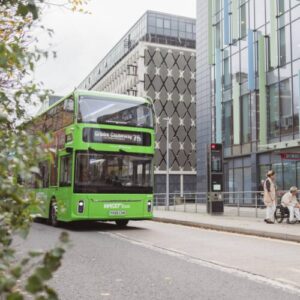
Future of bus services in region set out in more detail
Future of bus services in region set out in more detail.
Share: 31: Walk in to work out
Walking is the most basic form of physical activity humans can undertake to maintain good health. A key paper setting out the benefits of walking was published in 1997 and remains an important resource for walking promotion.1 This set out that regular walking reduces the risk of cardiovascular and respiratory diseases, type 2 diabetes, some cancers, deaths from all causes, and helps to counter depression and maintain mental wellbeing. Walking is a rhythmic, dynamic, aerobic activity of large skeletal muscles that confers the multifarious benefits of this with minimal adverse effects.
Any amount of walking, and at any pace, expends energy and hence the potential for long term weight control. Walking faster than customary, and regularly, in sufficient quantity to raise heart rate to 70% of maximum develops and sustains physical fitness through increased cardiovascular capacity and endurance (stamina) for bodily work and movement in everyday life that also provides reserves for meeting exceptional demands. Muscles in the legs, limb girdle and lower trunk are strengthened along with improved flexibility. Bone strength is also improved and subsequent studies have reported on this.
Unlike so much physical activity, there is little, if any, decline in middle age. It is a year-round, readily repeatable, self-reinforcing, habit-forming activity and the main option for increasing physical activity in sedentary populations. Thus, walking is ideal as a gentle start up for the sedentary, including the inactive, immobile elderly, bringing a bonus of independence and social well-being. As a general policy, a gradual progression is indicated from slow, to regular pace and on to 30 minutes or more of brisk (ie 6.4 km/h) walking on most days.
These levels should achieve the major gains of activity and health-related fitness without adverse effects. Yet, low levels of walking are a major factor in today’s widespread waste of the potential for health and well-being that is due to physical inactivity. Car use has substantially eroded levels of walking since the 1980s.2 This waste is manifest in impaired functional capacities, overweight, disease, disability, premature death and the concomitant human and economic costs.
Given that the majority of the population of England is overweight or obese3 a particularly important benefit can be walking’s feasibility in the treatment of overweight individuals because cardiovascular functional capacities are likely to be poor, and other exercises such as jogging and aerobics may be hazardous. In equal measure, walking can help those currently with a healthy weight to maintain existing weight. The authors conclude that walking is the nearest activity to perfect exercise. ‘I have two doctors, my left leg and my right…’.
1 Morris, J., Hardman, A. 1997 Walking to health, Sports Medicine, 23(5):306-332.
2 Department for Transport, 2007 National Travel Survey 2006. London: DfT.
3 Government Office for Science, 2007 Tackling Obesities: Future choices – Project report. Foresight Report. London: GOS.

Future of bus services in region set out in more detail.

January marks a milestone for Kids Go Free, the popular regional offer providing free bus travel for under-16s in the...

Many of the West’s bus passengers are seeing improvements to bus information across our region, with around 150 new information...

Visitors to Bath can enjoy free Park & Ride travel from 19 to 24 January, thanks to the West of...

Plans for a new transport hub in Pill, North Somerset, are moving forward with works set to start early January...